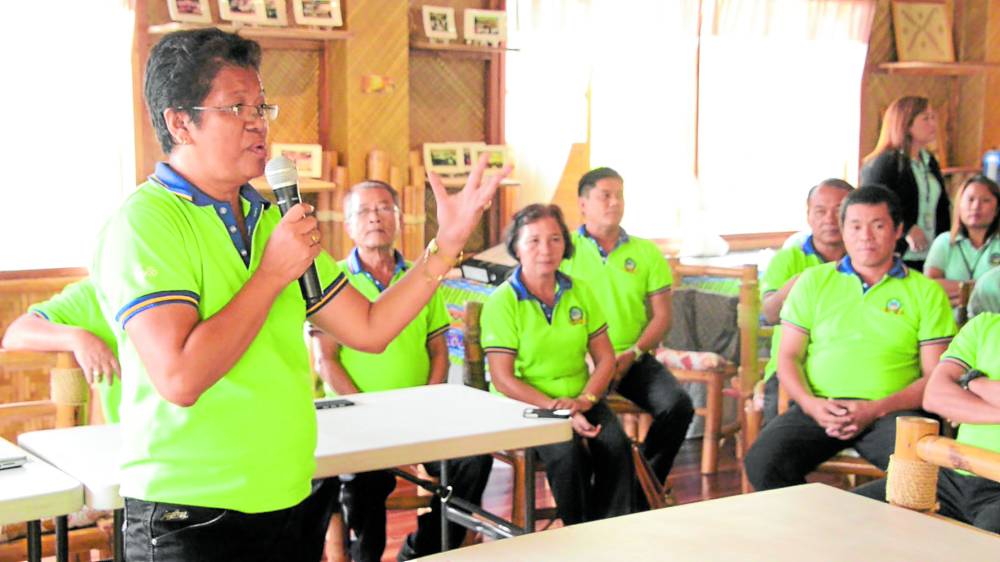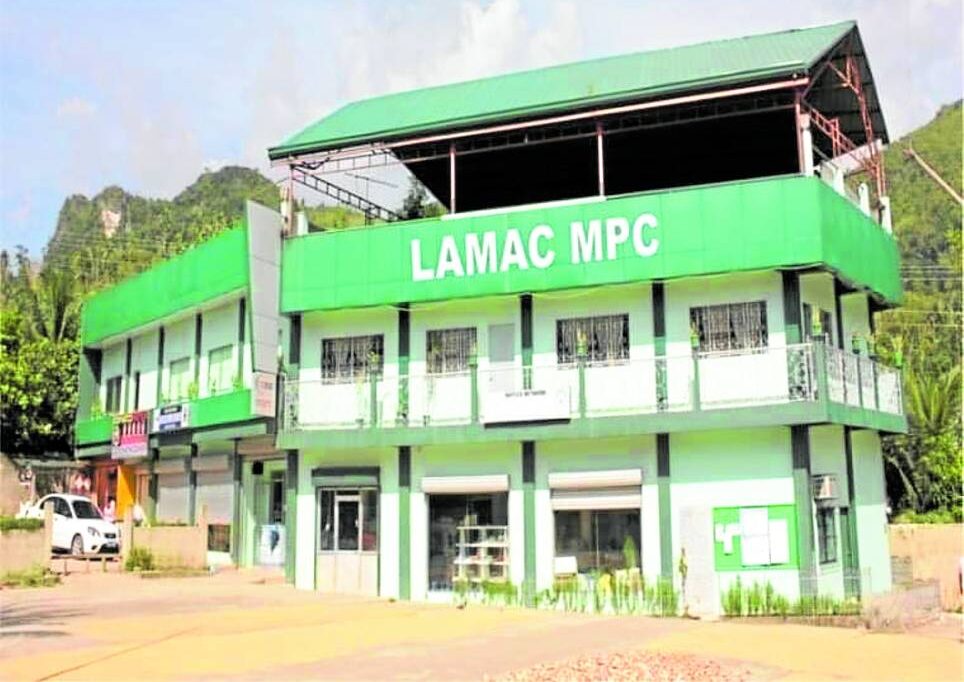From barrio midwife to leader of multibillion-peso farmers co-op

RURAL ENABLER Limocon speaking to co-op members. —CONTRIBUTED PHOTO
More than four decades ago, Ma. Elena Limocon set foot in Lamac valley in the municipality of Pinamungajan, 50 kilometers south of Cebu City. This was her first assignment as a midwife. Armed with her newly acquired diploma and faith in the Lord, Limocon eventually settled into an isolated place she would call her abode. Little did she know that she would not only assist women in delivering children but also be entrusted with the enormous task of birthing and leading a cooperative.
Reminiscing about the early days of Lamac Multi-Purpose Cooperative (LMPC), at which she has been general manager for more than 30 years, Limocon recalls arriving in a remote community with “no roads, no electricity and no water.” It was difficult to deliver health services due to lack of transportation and access road.
Farmers in the community had already established Lamac Samahang Ngayon back in 1973 with about 70 original members, but it went downhill due to the lack of educational and organizational skills. That setback prompted the barangay council to seek Limocon’s assistance to establish a new farmers’ cooperative that would later become LMPC.
“I didn’t have that dream (of leading a cooperative) because it’s very far from my profession,” says Limocon. But because she saw the need for an organization that could pool resources to help fulfill the needs of the community, she took on the challenge. She wanted to be “part of the transformation” of the barangay.
When they took over in 1986, the first order of business was to profile farmers and fisherfolk in the area. Based on their survey and interviews, they discovered that agricultural producers in that secluded small town had no means to scale up their output. They had no access to funding, crop inputs and post-harvest facilities.

LMPC’s branch at Purok Adelfa, Cebu, one of its 56 branches. —CONTRIBUTED PHOTO
Landbank financing
The members of the old cooperative contributed P50 each as initial funding for consumer and marketing needs. Even as they wanted to help more farmers and fisherfolk, they recognized that government had limited resources. They had to be self-reliant and find ways to bankroll their operations. To jumpstart the new entity, they went Christmas caroling and generated P20,000 in initial capital.
“During that time, they (members) could borrow P500. Then we would pray that they pay their loans so that others can borrow too,” says Limocon.
Thanks to their hard work—and divine intervention, as Limocon says—LMPC managed to get an initial credit line of P1 million from state-run Land Bank of the Philippines in 1992. The government bank also provided technical support and other capacity-building initiatives for LMPC.
Since then, LMPC has been a partner of Landbank in relending activities. This partnership flourished over the years, with total approved loan at Landbank now hitting P1.4 billion for agri and non-agri-related projects. LMPC is also an accredited agent banking partner, providing basic banking services in remote areas without Landbank presence.
“We learned from the training, the capacity-building extended to us. That’s why we have a covenant to avail of the free training during that time even if it meant being absent from our work,” says Limocon.
For its part, Landbank’s total agricultural loans across the country reached P261.66 billion as of end-2022, representing 23 percent of its total loan portfolio. Lending to agriculture grew 10.4 percent in the last 10 years, outpacing the farm sector’s average growth rate of less than 1 percent.
This 2023, Landbank plans to extend P275 billion in loans to the agriculture sector, such as through farmers cooperatives like LMPC.

Ma. Elena Limocon
P3.2-B asset base
To date, LMPC boasts of 132,925 regular members and 20,089 youth members. They comprise small farmers (including agrarian reform beneficiaries), fishers, drivers, entrepreneurs, teachers and overseas Filipino workers in Cebu, Bohol, Negros Oriental, Negros Occidental and Leyte. With 56 branches in these provinces, LMPC has grown its total asset base to P3.2 billion while capital now stands at P822 million.
Its initiatives include business development of agri-based programs and projects, typically in partnership with various government and other private agencies, alongside relending for cacao production and distribution.
LMPC has an existing partnership with the Cebu Technological University (CTU) to supply 86,000 grafted cacao seedlings and deliver 48,000 grafted planting materials.
In Cebu, LMPC is the lead institutional proponent of the Farmer Entrepreneurship Program, which promotes a value chain approach called agro-enterprise development for long-term and sustained improvement of the farmer’s livelihood and condition. It supplies food produce to institutional buyers.
The group also has a manufacturing village—a convergence of countryside manufacturers that make use of locally sourced raw materials and turn them into quality products. This center also provides linkage to prospective buyers through partnership and contracts. The cooperative collaborated with Landbank, Department of Science and Technology Region 7, Philippine Coconut Authority, CTU, Department of Trade and Industry and various local government units to build this industrial hub.
Diversification
LMPC is also supporting community-based hybrid rice farming. It plans to process harvested rice in the province and expand its milk business in partnership with the National Dairy Authority.
LMPC also has some property ventures. Aside from owning a training and resort facility called Hidden Mountain Valley Resort, LMPC provides low-cost housing in Lamac, offering affordable and flexible payment schemes.
“That is the dream of the Lamac cooperative, that families are intact so that in times of disaster or crisis, they are together. That’s the legacy that we want to leave to the people with the help of our partners,” says Limocon.
Although LMPC is dominated by female members—92,487 are women while 40,438 are men—Limocon is hoping that more men will participate to fulfill the cooperative’s commitment to attain gender balance. “We have developed services that will attract the male to just stay (do farming) and no longer work at construction sites,” she adds.
The co-op is likewise aspiring to attract young people to the food sector by holding social gatherings, honing their skills and abilities, and providing livelihood opportunities. “We finance them and also link [them with] the market. They are delivering their produce to Jollibee and Chowking,” says Limocon.
LMPC has now gained foothold in Mindanao and eventually plans to deliver more services to other parts of the Philippines. “We want to make them realize that there is money in agriculture and that agriculture is a noble profession,” Limocon says. INQ
Lamac cooperative eyed as model for sustainable development
Read Next
Subscribe to INQUIRER PLUS to get access to The Philippine Daily Inquirer & other 70+ titles, share up to 5 gadgets, listen to the news, download as early as 4am & share articles on social media. Call 896 6000.
For all the latest Business News Click Here
For the latest news and updates, follow us on Google News.



